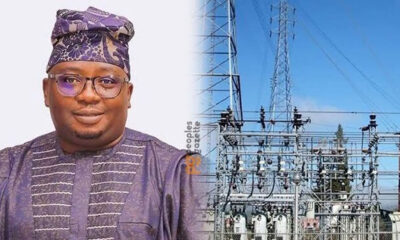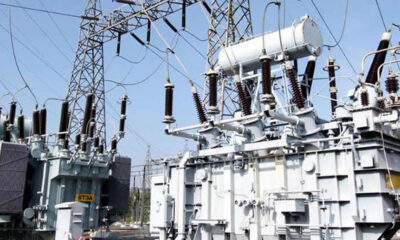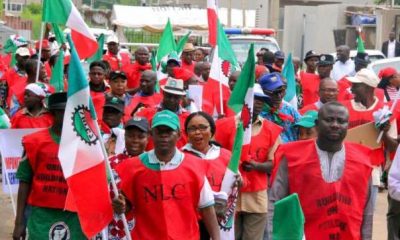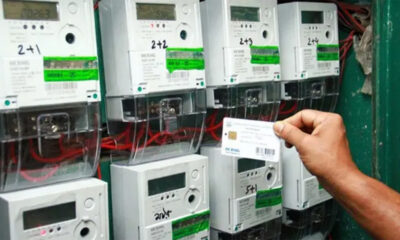News
Despite widespread blackout, Discos reject 1,769MW of electricity

Despite widespread blackout, Discos reject 1,769MW of electricity
Despite the widespread blackout and the worsening state of electricity supply in Nigeria, the latest figures on the daily load summary of power distribution companies indicate that the firms failed to distribute about 1,769.91 megawatts of electricity between February 1 and 14, 2024.
Data from the Transmission Company of Nigeria, obtained in Abuja on Monday, showed that though some of the power firms received excess electricity load allocation during the period, most of them failed to utilise all the quantum of energy allocated to them by TCN.
Nigeria’s power situation grew worse since January this year, forcing the Minister of Power, Chief Adebayo Adelabu, to declare on Saturday that some power firms and TCN had been summoned to provide reasons for the worsening state of electricity supply in their regions.
Adelabu also pointed out that investigations by the power ministry showed that some power distribution companies were rejecting electricity, despite the scarce supply of the commodity.
“Findings revealed that some distribution companies were deliberately not taking up power supply from TCN while some power lines were also damaged by vandals in Abuja, Benin, Port Harcourt and Ibadan regions,” Adelabu stated in a statement issued in Abuja.
The minister’s position may have been justified as an analysis of the latest figures on the daily load summary of power distribution companies by our correspondent on Monday indicated that the Discos failed to distribute about 1,769.91MW of power in the first two weeks of February.
Nigeria has 11 power distribution companies and they include Abuja, Benin, Eko, Enugu, Ibadan, Ikeja, Jos, Kaduna, Kano, Port Harcourt and Yola Discos.
READ ALSO:
- Same Marriage that is sustaining Olu Jacobs failed Mr Ibu – Ajinwa
- Reno Omokri blasts NLC: “You have more strikes than Osimhen”
- IGP bars POS operators from police stations nationwide
On February 1, 2024, seven of the power distributors failed to utilise a total of 128.62MW of electricity, while four others including Benin, Ibadan, Port Harcourt and Yola took a cumulative excess load allocation of 61.91MW.
By taking excess load, it means the Disco’s actual energy consumption for that particular day was higher than the load allocated to it by the Transmission Company of Nigeria.
However, the actual consumption figures of most Discos are usually lower than their allocated load, leading to unutilised or rejected energy by the power distributors.
On February 2 and 3, the Discos failed to utilise a total of 108.25MW and 71.54MW respectively, while they received excess load allocation 22.35MW and 65.45MW respectively.
On February 4, it was observed that only 4.45MW was not utilised by Kano Disco; while 327.47MW excess load was received by 10 other Discos. The low rejection of electricity on this day was due to low power generation on February 4, 2024.
On February 5, there was no rejection of electricity by any Disco, while 211.04MW of excess load was allocated to the 11 power distributors due to the low power generation recorded on that day.
The next day being February 6, three of the power firms failed to distribute 197.32MW, while eight others received excess load allocation of 200.09MW.
On February 7, four of the firms failed to utilise 216.1MW, while the remaining seven took an excess load of 162.02MW, as figures from TCN showed that the power firms rejected a total of 726.28MW of electricity in the first week of last month.
On February 8, eight power firms did not distribute 126.33MW, as three others took an excess load of 31.77MW; while the next day, nine power distributors failed to utilise 137.9MW, as the remaining two got an excess load of 39.27MW.
On February 10, nine of the Discos rejected 185.47MW, as two others took an excess load of 22.23MW; while on February 11, eight of the firms did not distribute 142.86MW, and three others got an excess load of 60.66MW.
READ ALSO:
- Children starving to death in Northern Gaza hospitals – WHO
- Dangote immortalises Herbert Wigwe, names Lagos refinery road after him
- Police nab Lecturer over alleged r@pe of female student
On February 12, eight Discos did not distribute 132.27MW; three others received excess load allocation of 45.83MW, while on February 13, six Discos failed to utilise 133.8MW as five others took an excess load of 48.09MW.
Five power distributors rejected 179.6MW of electricity on February 14, while the remaining six of them took an excess load allocation of 83.18MW.
This shows that in the second week of February, from 8th to 14th, the power distributors did not distribute about 1,043.63MW of electricity. They, however, received excess load allocation of 330.97MW.
Worried by the poor electricity supply situation, the power minister had in a letter signed by the Director, Distribution Services at the Federal Ministry of Power, B.U Mustapha, ordered the CEOs of Abuja and Ibadan Discos, as well as TCN to attend a meeting called by Adelabu this week.
They would discuss issues bothering on worsening electricity supply in their regions with a view to proffer a lasting solution, a statement by Bolaji Tunji, Special Adviser, Strategic Communications and Media Relations to the minister, stated on Saturday.
Adelabu was quoted as saying that the management of other non-performing Discos would also be queried over non-performance as reports continue to filter in on the situation in their regions.
“These two Discos have been summoned due to the worsening power supply situation in their regions despite improved supply from TCN,” the power minister stated.
According to the statement, gas shortage notwithstanding, the ministry had been putting pressure on the power generating companies to improve performance and generation had been ramped up to over 4,000MW in recent days.
“So, we expect power supply to have improved across the country, unlike what we are experiencing in some regions, presently,” the minister stated.
Despite widespread blackout, Discos reject 1,769MW of electricity
News
Just in: Factional Zamfara assembly leaders want governor to represent budget

Just in: Factional Zamfara assembly leaders want governor to represent budget
A factional House of Assembly has emerged in Zamfara state with members demanding the re-presentation of the 2025 Appropriation Bill by Governor Dauda Lawal.
The group, made up of nine lawmakers who were suspended in February 2024 over allegations of misconduct, conspiracy, and illegal sitting, convened in Gusau, the state capital, and declared the formation of a parallel legislative body.
At the session, the lawmakers elected Hon. Bashir Aliyu Gummi as Speaker of the factional assembly.
During the sitting, the faction addressed several issues, including the state’s deteriorating security situation, economic challenges, and the recent reports of mass sackings within the state civil service allegedly carried out by the Lawal administration.
READ ALSO:
- 2027: Atiku remains the best to face Tinubu, says Dele Momodu
- NLC to IMF: Your reforms inflict hunger, poverty on masses
- Nigerians deserve truth about electricity, not propaganda, labour slams power minister
The group further demanded that Governor Lawal re-present the 2025 budget, arguing that the process followed in its initial passage was flawed. The governor had originally submitted the N545 billion Appropriation Bill to the widely-known State House of Assembly led by Speaker Bilyaminu Ismail Moriki in December 2024. The bill was passed and signed into law that same month.
Present at Wednesday’s session were Hon. Aliyu Ango Kagara (Talata Mafara South), Ibrahim Tudu Tukur (Bakura), Nasiru Abdullahi Maru (Maru North), and Faruk Musa Dosara (Maradun 1). Others included Bashar Aliyu (Gummi 1), Bashir Abubakar Masama (Bukkuyum North), Amiru Ahmed (Tsafe West), Basiru Bello (Bungudu West), and Mukhtaru Nasiru (Kaura Namoda North).
Just in: Factional Zamfara assembly leaders want governor to represent budget
News
NLC to IMF: Your reforms inflict hunger, poverty on masses

NLC to IMF: Your reforms inflict hunger, poverty on masses
The Nigeria Labour Congress (NLC) has taken a swipe at the International Monetary Fund (IMF) over its policy proposals to Nigeria and other African nations on how to rejuvenate their ailing economies.
Indeed, the NLC pointedly told the IMF that its conditionalities for giving loans to Nigeria and others were inflict pains of hunger and poverty on the masses.
The NLC President, Joe Ajaero, stated this when he received the IMF team team comprising the its Resident Representative for Nigeria, Christian H. Ebeke, and, Axel Schimmelpfennig from Washington, DC.
The purpose of the visit, it was learnt, was to assess how Nigerian workers and the general populace are being affected by the current socioeconomic environment and the hardship resulting from government policies.
The IMF delegation, led by Schimmelpfennig also sought insights from the NLC regarding the state of the labour market in Nigeria. According to them, the information gathered would contribute to the IMF’s annual country report for Nigeria.
Sources at the meeting disclosed that the IMF team acknowledged that the Nigerian government has been grappling with fiscal challenges since assuming office.
They emphasized that the IMF’s recommendations are purely advisory and not mandatory, based on the prevailing realities in each country.
The delegation expressed concern that, often, governments do not follow the IMF’s recommendations to the letter, instead adapting them to align with political objectives. In effect, the IMF attempted to distance itself from the adverse consequences of some recent economic reforms in Nigeria.
READ ALSO:
- Nigerians deserve truth about electricity, not propaganda, labour slams power minister
- INEC may allow Nigerians without PVCs to vote in 2027
- Air Peace suspends flights over NIMET strike
Nevertheless, the IMF team requested continued engagement with the NLC going forward.
Ajaero made it clear that governance should prioritize citizens’ welfare over profit-making.
News
‘Enough is enough’, Tinubu directs security chiefs to stop violent attacks

‘Enough is enough’, Tinubu directs security chiefs to stop violent attacks
President Bola Tinubu has ordered security operatives to end forthwith the violent attacks in some parts of the country, especially in Plateau, Borno, and Benue states.
He gave the directive during a meeting with security chiefs at the State House on Wednesday.
The meeting was attended by Nuhu Ribadu, the national security adviser (NSA); Mohammed Mohammed, director-general of the National Intelligence Agency (NIA); Emmanuel Undianeye, chief of defence intelligence; Oluwatosin Ajayi, director-general (DG) of the Department of State Services (DSS); and Femi Gbajabiamila, chief of staff (CoS) to the President.
Speaking with journalists after the meeting, Ribadu said Tinubu declared that “enough is enough” on the resurgence of violence in some parts of the country.
The NSA said the president directed security chiefs to work with the political authorities in states and at the grassroots level to find a lasting solution to the insecurity.
He said the security chiefs had acted on Tinubu’s previous instructions by meeting with political leaders in the affected communities and states.
The NSA said the meeting offered the security chiefs the opportunity to fully brief the president about the current security situation of the country.
“This time, we were able to sit with him for hours and give a proper briefing. We also took new instructions from him,” he said.
“Insecurity is not only a government problem.
“It also involves the subnational units — the communities, local governments, and especially the governors. The president directed that we work more closely with them.
“Some of these problems are community-related. While not entirely so, that element plays a significant role.
“Mr. President is working hard to ensure that Nigeria enjoys peace and stability. We are not relenting. We will not stop until we get the results he demands.”
On the resurgence of violent attacks in Borno, Ribadu said the terrorists were planting explosives during the period of relative peace in the state.
“This enemy does not give up easily. When there’s peace for a long time, they try to shock the public with an isolated incident,” he said.
The NSA said the security situation in the country is not yet at 100 percent, while noting that there is “significant improvement”.
Since the beginning of the month, many have been killed in some communities in Plateau State.
Benue State has also recorded violent attacks as over 50 people were killed in Ukum and Logo LGAs on April 18.
-

 metro15 hours ago
metro15 hours agoOmokri : How Tinubu’s political mastery started with Abiola, says El-Rufai, Obi’s forces can’t stop him
-

 metro3 days ago
metro3 days agoI’m not in supremacy battle with Ooni, says new Alaafin
-

 Education9 hours ago
Education9 hours agoJAMB officials seize candidates’ hijab at Caleb varsity, Muslim students kick
-

 Entertainment2 days ago
Entertainment2 days agoP-Square: Jude Okoye freed after two months detention
-

 International9 hours ago
International9 hours agoUS releases 41 countries granted 90-day entry without visas (full list)
-
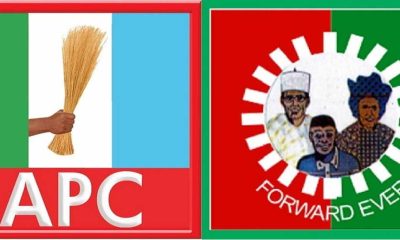
 Politics2 days ago
Politics2 days agoLabour Party collapses into APC in Plateau
-
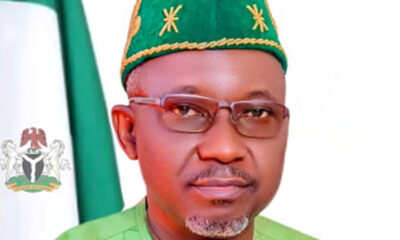
 Business3 days ago
Business3 days agoNigeria’s gas production increases by 15.6% to 227,931.65 mscf
-

 metro2 days ago
metro2 days agoNiger Gov Bago makes U-turn on dreadlocks ban after backlash

